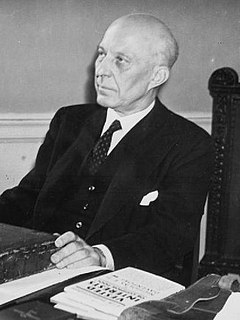| |||||||||||||||||
| |||||||||||||||||
| |||||||||||||||||
The 1935 Labour Party leadership election took place on 26 November 1935 when Herbert Morrison and Arthur Greenwood challenged Clement Attlee, the incumbent party leader of only one month and one day. Attlee, previously Deputy Leader, had been appointed as an interim leader the previous month when George Lansbury resigned and the general election was looming.

Herbert Stanley Morrison, Baron Morrison of Lambeth, was a British Labour politician who held a variety of senior positions in the Cabinet.

Arthur Greenwood, was a British politician. A prominent member of the Labour Party from the 1920s until the late 1940s, Greenwood rose to prominence within the party as secretary of its research department from 1920 and served as Parliamentary Secretary to the Ministry of Health in the short-lived Labour government of 1924. In 1940, he was instrumental in resolving that Britain would continue fighting Nazi Germany in World War II.

Clement Richard Attlee, 1st Earl Attlee,, was a British Labour Party politician who was Prime Minister of the United Kingdom from 1945 to 1951.
With the Labour Party now having roughly three times as many MPs as in the 1931-5 Parliament, both Morrison and Greenwood stood in the annual election for leader, feeling that Attlee's appointment had only been intended as an interim measure. Morrison had not been an MP at the time of the October appointment, whilst Greenwood had declined to offer himself as a candidate then because he was strongly associated with trade union leaders such as Ernest Bevin, who were widely regarded as the reasons for forcing Lansbury to resign, a move that the vast majority of Labour MPs opposed.

Ernest Bevin was a British statesman, trade union leader, and Labour politician. He co-founded and served as general secretary of the powerful Transport and General Workers' Union in the years 1922–40, and as Minister of Labour in the war-time coalition government. He succeeded in maximizing the British labour supply, for both the armed services and domestic industrial production, with a minimum of strikes and disruption. His most important role came as Foreign Secretary in the post-war Labour government, 1945–51. He gained American financial support, strongly opposed Communism, and aided in the creation of NATO. Bevin's tenure also saw the end of the Mandate of Palestine and the creation of the State of Israel. His biographer, Alan Bullock, said that Bevin "stands as the last of the line of foreign secretaries in the tradition created by Castlereagh, Canning and Palmerston in the first half of the 19th century", and that due to the reduction in British power he has no successors.















